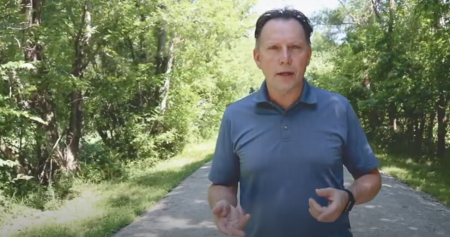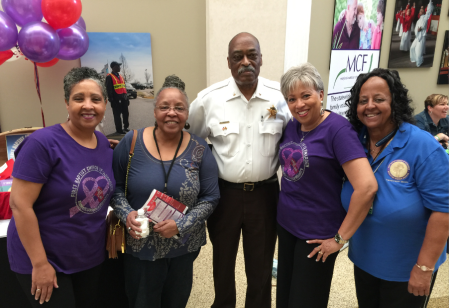Former domestic abuser, survivor work to eradicate domestic violence
How the Ananias Foundation came to be

Prior to launching the Ananias Foundation, Clark wrote a book, titled From Villain to Hero: Encouragement and a map to stop domestic violence or abuse that hurts the ones you love. “I really started the book while I was in the process of making changes in my life. I have … the thought that if I can ever figure this out, maybe this is something I can share with others. As I progressed and learned things and felt those changes in my life, the book continued to take form.”
While Clark “really didn’t do anything with it” at first, he had the book edited and published after he founded the Ananias Foundation in 2017 out of a desire to “provide opportunities for others to also discover what they need to stop hurting the ones that they love.”
“I really found nothing else out there that fit this particular niche in the domestic violence arena, something that would really help individuals that are causing harm, to heal that and to move forward,” he said.
The foundation was named after Ananias, who was asked by Jesus in the Acts of the Apostles to restore the sight of Saul, a persecutor of Christians who was blinded by a light from Heaven. Following Ananias’ encounter with Saul, his sight was restored, he repented and changed his name to Paul.
“Paul’s life changes and contributions are nothing short of a miracle, but it took Ananias to make it happen,” the foundation’s website maintains. “We at the Ananias Foundation are called to seek out and restore individuals who have done harm to others because we know they have the potential to change, then go on to do great things.”
With the exception of From Villain to Hero, all of the support groups and materials offered by the Ananias Foundation, including a guidebook for “stopping hurtful behavior,” are available free of charge. The foundation provides resources for those seeking counseling and offers advice to those looking to address the behavior of their partners, friends or family members.
In addition to founding the Ananias Foundation, Clark has remarried and enjoys a “great, close relationship” with his children as well as his new wife.
“Lynn and I have a wonderful relationship and I feel so grateful that the changes I was able to make, that God made in me, I can now enjoy a great marriage and a loving, respectful relationship,” he said.
One of Clark’s children later told him that when he had hit “rock bottom,” he had almost gotten “within an inch of not wanting to have anything to do with you.”
The Prince George’s County Family Justice Center

An encounter she had with her daughter, who was herself a victim of domestic abuse, at the Montgomery County Family Justice Center motivated Thomas to work to establish a similar resource in Prince George’s County.”
“Witnessing her receive all of the services that she needed in one place, I said, Lord, we must have this in Prince George’s County. The Maryland legislature and commissioners gathered around and … we put the proposal in place. My vision to establish a Family Justice Center in Prince George’s County was realized on June 9, 2016, during a ribbon cutting ceremony,” she recalled.
Thomas described the Justice Center as a “one-stop shop” for victims of domestic violence: “The mission is to serve the needs of people that are impacted by domestic violence, sexual assault, human trafficking and elder abuse, while delivering integrated, comprehensive and client-driven options that will empower survivors to find hope and rebuild their disrupted lives.”
The Justice Center works with partners, including the sheriff and the House of Ruth, which are co-located in the building “to help survivors so that they’re not revictimized, they don’t have to tell their story over and over again.”
Thomas, along with the Department of Family Services and the Prince George’s County State’s Attorney’s office, have offered churches training on how to respond to domestic violence. As a result, she said, “many churches now are hosting domestic violence training.”
“I think that it’s critical that pastors are adequately familiar with local resources so that when survivors do come, there’s not the missed opportunity for victims to access services. Training, I think, is critical within the congregations, training the leaders on the dynamics of domestic abuse. We would be much more effective as a church, as a church body, if we understood the dynamics of abuse,” she stressed.
“The Church has been silent on this issue for quite some time. I’m just grateful, grateful for my leadership in combating and being proactive to bring about a zero tolerance of verbal, physical, sexual, and emotional abuse. We don’t want to put a Band-Aid on it. We really want to eradicate domestic abuse.”
She has also partnered with community members in an effort to address another problem that faces many victims of domestic violence: a need for financial assistance. As a result of a “lack of finances,” many will return to their abusers. She is “currently working with a young man in the county that has a job readiness program where when survivors come into his shelter, he’s doing job training.”
The role of the church in addressing domestic violence

Clark contended that in addition to the Ananias Foundation, there is a “tremendous opportunity for churches to talk about domestic violence from the pulpit.” He suggested that churches should “make sure that resources … are available in their community, on the bulletin, on the sign in front.”
“What that does is that tells people we know that this is an issue, we’re aware of it and we’re here to help. Ananias Foundation encourages churches to not only help victims but we think churches and that relationship with God is uniquely positioned to help those that are causing harm. For every victim, there’s also a perpetrator. What can we do to reach those that are causing harm? When they do discover that, their behavior will change.”
Echoing Clark’s sentiment, Thomas also underscored the need for churches to step up.
“The faith-based community plays a very unique and pivotal role in the effective response to domestic violence within their congregations and their communities,” she said. “This is because survivors of abuse often seek their faith community for spiritual guidance and support before or in lieu of a community program.”
Through her domestic violence ministry, Thomas has worked to provide pastors and their congregations with the necessary training. Her ministry works to “educate the congregation, engage the community and empower the survivor.” Expressing regret that she was not “smart enough to see the red flags” in her abusive relationship, she stressed that from a church’s perspective, “it’s all about prevention.”
As part of its domestic violence ministry, First Baptist Church hosts a monthly support group for victims of domestic violence, offering them “healing” and letting them know that “they have a safe place.” While the coronavirus pandemic has disrupted many aspects of everyday life in the United States, participation in the support group has actually increased during the pandemic.
“As a matter of fact, during the pandemic, our monthly support group numbers have gone up … within the virtual format because it really allows the participants the opportunity to remain anonymous if they desire to do that,” Thomas revealed. “In the support group, you really have an opportunity to connect and walk them through the healing process. So that’s what we do mostly.”
Additionally, she has worked with leadership at the state and local level to advise churches about how to respond to the issue of domestic violence.
“How faith leaders counsel victims of domestic violence can directly impact the outcome for victims, their families & abusers. As a faith leader, I train on effective statements called the Do’s and Don’ts’ which highlights what to say during a counseling session with a survivor,” she explained.
One of the “don’ts” is asking, “What did you do to provoke him?”
“There is no excuse for abuse,” she asserted.
While therapy can be effective for some couples, Thomas advised that if abuse is present in the relationship, couples should not seek counseling together.
“If the therapist tries to hold the abusive partner accountable, they will often refuse to attend further sessions and may even choose to escalate the abuse putting the victim in danger because the abuser feels their power and control was threatened. So abuse is not a couple’s issue,” she pointed out.
Although she believes that many churches have been “reactive instead of proactive” when it comes to addressing the issue of domestic violence, Thomas has hope for the future.
While a survey found that 74% of priests underestimated the amount of domestic violence taking place in their congregations, she was encouraged by the fact that “many of them said that they would answer the call if they received the proper training.”
She stressed, “How we respond as a faith community is critical to the outcome of survivors.”





















